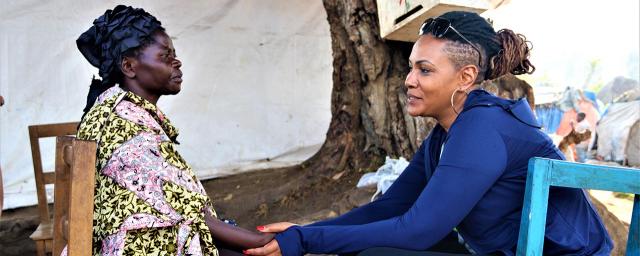
‘Saving lives sustainably and enabling affected communities to safeguard their dignity.’
Why did you decide to work in the humanitarian sector?
As an African, I was unfortunately exposed at a very young age to the negative effects of ethnic conflicts and poverty on vulnerable populations, more specifically women and children on the African continent. As soon as the opportunity arose, I benefited of training and specialized in public health to be able fulfil my passion and my commitment to contribute to the improvement of people's lives.
How important is humanitarian work in your areas of intervention?
Humanitarian action is a powerful lever for development. Humanitarian work allows us to meet the urgent needs, alleviate suffering, and save the lives of people affected by conflict, especially in the eastern part of the DRC, but also to reduce poverty and the consequences of natural disasters. Working in this sector allows me to use my knowledge and skills to help people affected by crises, conflicts, or natural disasters to cope with hardship and to maintain their human dignity.
What is the impact of humanitarian assistance where you work and what remains to be done?
One of the best ways to see the impact of our work is through the feedback from the populations who have benefited from our assistance and who are at the heart of humanitarian action. For example, during my last field visit after the deadly floods in Kalehe, I was touched when the affected populations to whom we provided assistance expressed their gratitude to me.
Listening to an elderly gentleman who had to move to Kalemie due to conflict-driven violence express his gratitude for being alive and secure, despite witnessing brutalities inflicted on his dear ones – that's when you truly realize the profound significance and influence of your role as a humanitarian. This poignant testimony encapsulates the far-reaching effect of our efforts, along with those of fellow humanitarian counterparts operating in the Democratic Republic of Congo.
In Kalehe, thanks to funding from the DRC Humanitarian Fund and with the collaboration of our partner AVUDS, we have provided the IDPs with temporary shelter, drinking water, food, intimate hygiene kits, etc. In sum, we were able to reach more than 18,000 people who now have access to sufficient drinkable water thanks to the supply structures built or rehabilitated in the area. In addition, we have trained 80 people from women's forums and protection committees to contribute to change.
However, despite our efforts and determination, there is still a lot to do. For example, post-conflict or disaster trauma does not automatically disappear with humanitarian assistance. It is therefore urgent to provide comprehensive aid that not only supports survival and resilience, but also the psychological trauma that affects the lives of vulnerable populations.
What challenges do you face?
Our challenges are enormous and include diverse crises, difficult access to conflict zones, low level of funding compared to the needs we see in the country, specific needs of the most vulnerable populations such as women, children, the elderly and disables in terms of protection, equitable access to human rights, etc.
Addressing these challenges requires a good predisposition in our humanitarian responses to strengthen the resilience of affected populations to help them rebuild their lives. Furthermore, there is a need for an increasing involvement of governmental authorities to create an enabling environment and equitable access to basic social services and access to land. We also need to sustain the achievements of our humanitarian actions through good ownership by local populations and authorities and effective collaboration between humanitarian and development actors so that the impact of humanitarian work is sustainable.
What is your message to the world about the World Humanitarian Day?
As humanitarians, we are part of the solutions and are active in protecting vulnerable or endangered people and reducing their suffering and on this day , I would like to honour all the humanitarians who strive to meet the growing needs within DRC My message is to continue to put the needs of the people affected at the center of all our actions, our discussions and our decisions, to give them a voice in the search for solutions and follow-up, and finally, to take their feedback into account for an effective humanitarian action; it is most important to save lives sustainably and allow affected communities to safeguard their dignity.